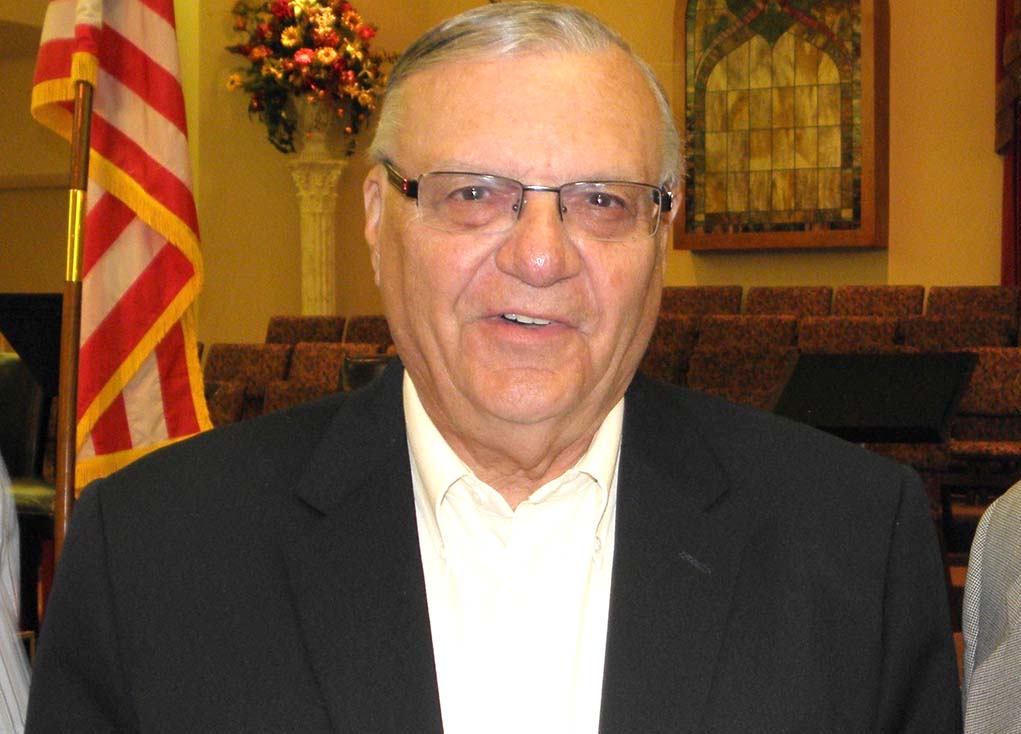PHOENIX – Following oral arguments on Oct. 4 regarding former Maricopa County Sheriff Joe Arpaio’s motions for vacatur (vacate the judgment) and for dismissal with prejudice, U.S. District Judge Susan Bolton found the presidential pardon of e Arpaio to be valid and ordered the action for criminal contempt dismissed with prejudice.
Bolton previously found Arpaio guilty of criminal contempt. The criminal charge stems from a civil action filed by an illegal alien against Arpaio accusing the Maricopa County Sheriff’s Office of racial profiling.
At the conclusion of the Oct. 4 hearing, Bolton took under advisement whether the court would enter any further orders.
On Oct. 19, Bolton issued an order acknowledging her previous findings that the presidential pardon was valid and her dismissal of the criminal contempt action with prejudice.
However, regarding the motion for vacatur, Bolton quoted Black’s Law Dictionary and stated a presidential pardon, once accepted, “releases the wrongdoer from punishment and restores the offender’s civil rights without qualification” adding, “It does not erase a judgment of conviction, or its underlying legal and factual findings.”
Citing United States v. Crowell, Bolton noted “a pardon does not blot out guilt or expunge a judgment of conviction.”
In a footnote, Bolton pointed out the U.S. Supreme Court originally signaled in dicta (a judge’s editorial opinion) from an 1866 case that “a presidential pardon may have an expunging effect” whereas the “pardon reaches both the punishment prescribed for the offence and the guilt of the offender; and when the pardon is full, it releases the punishment and blots out of existence the guilt, so that in the eye of the law the offender is as innocent as if he had never committed the offence.”
However, Bolton went on to say the court later rejected that view in 1915 in Burdick v. United States.
In conclusion, Bolton stated, “The power to pardon is an executive prerogative of mercy, not of judicial record keeping,” and said, “To vacate all the rulings in this case would run afoul of this important distinction.”
Bolton denied Arpaio’s motion for vacatur and dismissal with prejudice in that it sought relief beyond dismissal with prejudice.
Arpaio immediately filed a notice of appeal to the Ninth Circuit.
Arpaio’s Attorney John Wilenchik believes the law is clear and the court has an obligation to reverse the conviction.
Wilenchik indicated, if not for the pardon, Arpaio would have appealed, been granted a jury and seemed confident Arpaio would have received an acquittal and been vindicated.
Presidential pardons are generally issued long after a person is convicted and sentenced so they only forgive without blotting out the conviction.
Because the president issued a pardon prior to the conclusion of sentencing and appeals, Arpaio’s lawyers argue the court is obligated to vacate its verdict and dismiss the case with prejudice.
The issue in Arpaio’s case is not all that dissimilar to that of Aaron Hernandez, the former tight end for the New England Patriots who committed suicide in his prison cell in April 2017 while the appeal of his 2015 murder conviction was still pending.
In vacating Hernandez’s conviction, Massachusetts Superior Court Judge E. Susan Garsh stated, “Abatement has been practiced in federal and state courts for more than a century” and agreed with Hernandez’s appellate attorneys’ request to vacate his conviction since he died before his direct appeal was decided.
Although Arpaio didn’t die prior to the conclusion of his appeals, and the vacatur of Hernandez’s conviction was met with disappointment by Bristol County, Mass. Assistant District Attorney Patrick Bomberg, who said, “The defendant should not be able to accomplish in death what he could not accomplish in life,” the fact that neither were in a position to see their appeals through to conclusion remains the same.
On Monday, Oct. 23, the Massachusetts Supreme Judicial Court denied the district attorney’s petition to reinstate Harnandez’s first degree murder conviction.





